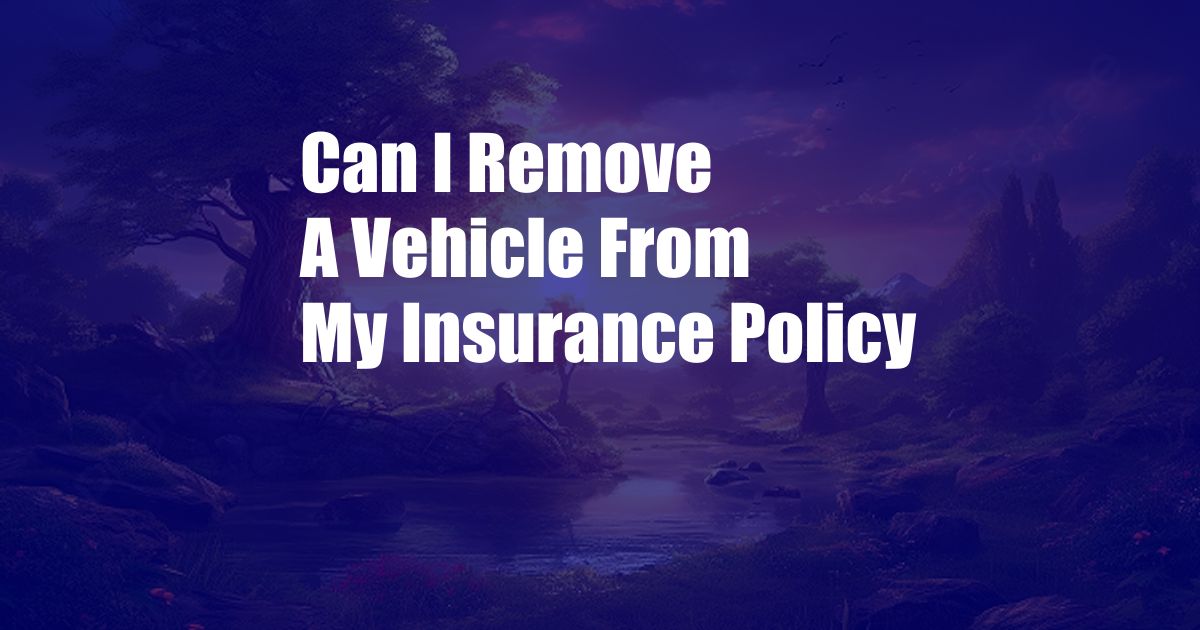
Can I Remove a Vehicle From My Insurance Policy?
I bought a second car a few months ago, and my insurance premium has been steadily increasing since then. I started looking for ways to save money, and one option I discovered is removing my old car from my insurance policy. But before I took any action, I wanted to do some research to make sure that would be the right decision. Here’s what I found.
Removing a vehicle from your insurance policy can be a great way to save money on your premium. However, there are a few things you need to consider before making this decision. First, you need to make sure that you won’t be driving the vehicle anymore. If you think there’s any chance you’ll need to drive the car again in the future, it’s best to keep it on your policy. Second, you need to make sure that you have adequate coverage for the vehicle you’re keeping on your policy. If you have an accident, your insurance company will only cover the damages to the vehicle that’s listed on your policy.
Deciding Whether to Remove a Vehicle
There are several reasons why you might want to remove a vehicle from your insurance policy. Maybe you’ve sold the car, or maybe you’ve given it to a family member or friend. Perhaps you’re not driving the car anymore, or you’ve decided to store it for an extended period. Whatever the reason, it’s important to understand the implications of removing a vehicle from your policy.
If you remove a vehicle from your policy and you’re still the owner of the vehicle, you’ll need to maintain liability insurance for the vehicle. This is because you’re still legally responsible for any damages the vehicle may cause, even if it’s not being driven. You can purchase liability-only insurance for the vehicle, which is typically much cheaper than comprehensive or collision coverage.
What Happens When You Remove a Vehicle?
When you remove a vehicle from your insurance policy, your insurance company will recalculate your premium. The amount of your premium will decrease because you’re no longer paying to insure the vehicle. However, the amount of your premium may also decrease if you have other vehicles on your policy. This is because insurance companies typically offer discounts for multiple vehicles.
It’s important to note that removing a vehicle from your policy does not cancel your insurance. Your insurance policy will remain in effect for the vehicles that are still listed on the policy. However, if you remove all of the vehicles from your policy, your insurance policy will be canceled.
Tips for Removing a Vehicle from Your Policy
If you’ve decided to remove a vehicle from your insurance policy, there are a few things you should do to make sure the process goes smoothly.
- Contact your insurance company. The first step is to contact your insurance company and let them know that you want to remove a vehicle from your policy. They will ask you for some information about the vehicle, such as the year, make, and model. They will also ask you for the date you want the vehicle removed from your policy.
- Provide documentation. If you’ve sold the vehicle, you will need to provide your insurance company with a copy of the sales receipt. If you’ve given the vehicle to a family member or friend, you will need to provide your insurance company with a letter stating that you have transferred ownership of the vehicle.
- Pay any outstanding premiums. If you have any outstanding premiums on your insurance policy, you will need to pay them before your insurance company can remove the vehicle from your policy.
FAQs About Removing a Vehicle from Your Policy
Q: Can I remove a vehicle from my insurance policy if I still owe money on it?
A: In most cases, yes. However, you need to make sure that you have adequate coverage for the vehicle. You can purchase liability-only insurance for the vehicle, which is typically much cheaper than comprehensive or collision coverage.
Q: What happens if I remove a vehicle from my policy and then I have an accident?
A: If you remove a vehicle from your policy and then you have an accident, your insurance company will not cover the damages to the vehicle. You will be responsible for paying for the damages out of your own pocket.
Conclusion
Removing a vehicle from your insurance policy can be a great way to save money on your premium. However, it’s important to understand the implications of removing a vehicle from your policy before you make this decision. If you’re not sure whether or not you should remove a vehicle from your policy, it’s best to contact your insurance company and talk to them about your options.
Are you interested in learning more about removing a vehicle from your insurance policy? If so, I encourage you to do some research online or talk to your insurance agent. There are a lot of resources available to help you make the best decision for your situation.